Constructors and the Rule of the Big 3
Steven J Zeil
1 The Default Constructor
The default constructor is a constructor that takes no arguments. This is the constructor you are calling when you declare an object with no parameters. E.g.,
std::string s;
Book b;
Declaration
A default constructor might be declared to take no parameters at all, like this:
class Book {
public:
Book();
⋮
or with defaults on all of its parameters:
namespace std {
class string {
public:
⋮
string(char* s = "");
⋮
Either way, we can call it with no parameters.
Why Default?
For example, if we declared:
std::string words[5000];
then each of the 5000 elements of this array will be initialized using the
default constructor for `string`
- In fact, if we don’t have a default constructor for our class, then we can’t create arrays containing that type of data.
Compiler-Generated Default Constructors
Because arrays are so common, it is rare that we would actually want a class with no default constructor. The C++ compiler tries to be helpful:
If we create no constructors at all for a class, the compiler generates a default constructor for us.
- That automatically generated default constructor works by initializing every data member in our class with its own default constructor.
-
In many cases (e.g., strings), this does something entirely reasonable for our purposes.
-
Be careful, though: the “default constructors” for the primitive types such as
int,doubleand pointers work by doing nothing at all. The value is left uninitialized.
-
1.1 Default constructor examples
Book default constructor
If we haven’t created a default constructor for Books, we could add one easily enough:
class Book {
public:
typedef AuthorIterator AuthorPosition;
Book (Author); // for books with single authors
Book (const Author[], int nAuthors); // for books with multiple authors
Book();
std::string getTitle() const { return title; }
void setTitle(std::string theTitle) { title = theTitle; }
⋮
private:
std::string title;
int numAuthors;
std::string isbn;
Publisher publisher;
AuthorNode* first;
AuthorNode* last;
friend class AuthorIterator;
};
To implement it, we need to come up with something reasonable for each data member:
Book::Book ()
numAuthors(0), first(0), last(0)
{
}
(We’ll let the strings title and isbn default to the std::string default of "", and we trust that the Publisher class provides a reasonable default constructor of its own.)
Address default constructor
class Address {
public:
Address (std::string theStreet, std::string theCity,
std::string theState, std::string theZip);
std::string getStreet() const;
void putStreet (std::string theStreet);
std::string getCity() const;
void putCity (std::string theCity);
std::string getState() const;
void putState (std::string theState);
std::string getZip() const;
void putZip (std::string theZip);
private:
std::string street;
std::string city;
std::string state;
std::string zip;
};
This class has no explicit default constructor. It does have another constructor, however, so the compiler will not generate an automatic default constructor for us.
There’s no good reason why we should not have a default constructor for this class. We might want arrays of addresses sometime.
class Address {
public:
Address (std::string theStreet, std::string theCity,
std::string theState, std::string theZip);
Address () {}
⋮
As you can see, there’s not much to it. All the data members are strings, and there’s really nothing much better for us to do than just rely on the default constructors for strings.
2 Copy Constructors
The copy constructor for a class Foo is the constructor of the form:
Foo (const Foo& oldCopy);
-
Like the default constructor, there is nothing special about the copy constructor itself.
- It’s just an ordinary constructor.
-
It’s special because of the number of common situations in which it gets used.
- Like the default constructor, the compiler often generates implicit calls to this constructor in places where we might not expect it.
Where are Copy Constructors Used?
The copy constructor gets used in 5 situations:
1) When you declare a new object as a copy of an old one:
Book book2 (book1);
or
Book book2 = book1;
2) When a function call passes a parameter “by copy” (i.e., the formal parameter does not have a &):
void foo (Book b, int k);
⋮
Book text361 (0201308787, budd,
"Data Structures in C++ Using the Standard Template Library",
1998, 1);
foo (text361, 0); // foo actually gets a copy of text361
3) When a function returns an object:
Book foo (int k);
{
Book b;
⋮
return b; // a copy of b is placed in the caller's memory area
}
4) When data members are initialized in a constructor’s initialization list:
Author::Author (std::string theName,
Address theAddress, long id)
: name(theName),
address(theAddress),
identifier(id)
{
}
5) When an object is a data member of another class for which the compiler has generated its own copy constructor.
Compiler-Generated Copy Constructors
As you can see from that list, the copy constructor gets used a lot. It would be very awkward to work with a class that did not provide a copy constructor.
So, again, the compiler tries to be helpful.
If we do not create a copy constructor for a class, the compiler generates one for us.
-
This automatically generated version works by copying each data member via their individual copy constructors.
-
For data members that are primitives, such as
intor pointers, the copying is done by copying all the bits of that primitive object.- For things like
intordouble, that’s just fine. - We’ll see shortly, however, that this may or may not be what we want for pointers.
- For things like
2.1 Copy Constructor Examples
2.1.1 Address
In the case of our Address class, we have not provided a copy constructor, so the compiler would generate one for us.
The implicitly generated copy constructor would behave as if it had been written this way:
Address::Address (const Address& a)
: street(a.street), city(a.city),
state(a.state), zip(a.zip)
{
}
- This is, in fact, a perfectly good copy function for this class, so we might as well use the compiler-generated version.
2.1.2 Book - simple arrays
#ifndef BOOK_H
#include "author.h"
#include "publisher.h"
class Book {
public:
typedef const Author* AuthorPosition;
Book (Author); // for books with single authors
Book (const Author[], int nAuthors); // for books with multiple authors
std::string getTitle() const;
void setTitle(std::string theTitle);
int getNumberOfAuthors() const;
std::string getISBN() const;
void setISBN(std::string id);
Publisher getPublisher() const;
void setPublisher(const Publisher& publ);
AuthorPosition begin() const;
AuthorPosition end() const;
void addAuthor (AuthorPosition at, const Author& author);
void removeAuthor (AuthorPosition at);
private:
std::string title;
int numAuthors;
std::string isbn;
Publisher publisher;
static const int MAXAUTHORS = 12;
Author authors[MAXAUTHORS];
};
#endif
Consider the problem of copying a book, and for the moment we will work with our “simple” arrays version.
Book - simple arrays (cont.)
 If we start with a single book object,
If we start with a single book object, b1, as shown here, and then we execute
Book b2 = b1;
because we have provided no copy constructor, the compiler-generated
version is used and each data member is copied.
Compiler-Generated Copy
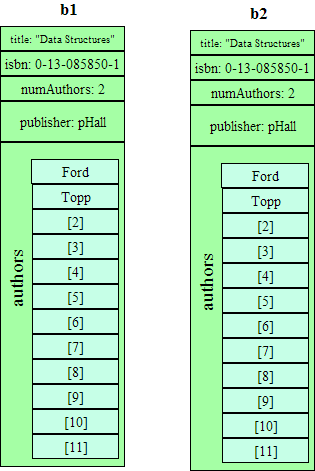 The new result would be something like this, which looks just fine.
The new result would be something like this, which looks just fine.
2.1.3 Book - dynamic arrays
Now let’s consider the problem of copying a book implemented using dynamically allocated arrays.
#ifndef BOOK_H
#include "author.h"
#include "publisher.h"
class Book {
public:
typedef const Author* AuthorPosition;
Book (Author); // for books with single authors
Book (const Author[], int nAuthors); // for books with multiple authors
std::string getTitle() const { return title; }
void setTitle(std::string theTitle) { title = theTitle; }
int getNumberOfAuthors() const { return numAuthors; }
std::string getISBN() const { return isbn; }
void setISBN(std::string id) { isbn = id; }
Publisher getPublisher() const { return publisher; }
void setPublisher(const Publisher& publ) { publisher = publ; }
AuthorPosition begin() const;
AuthorPosition end() const;
void addAuthor (AuthorPosition at, const Author& author);
void removeAuthor (AuthorPosition at);
private:
std::string title;
int numAuthors;
std::string isbn;
Publisher publisher;
int MAXAUTHORS;
Author* authors;
};
#endif
Copying dynamic arrays
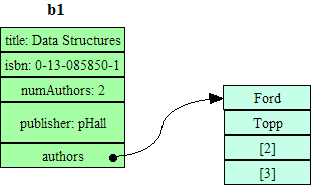 If we start with a single book object,
If we start with a single book object, b1, as shown here, and then we execute
Book b2 = b1;
because we have provided no copy constructor, the compiler-generated version is used and each data member is copied.
Compiler-Generated Copy
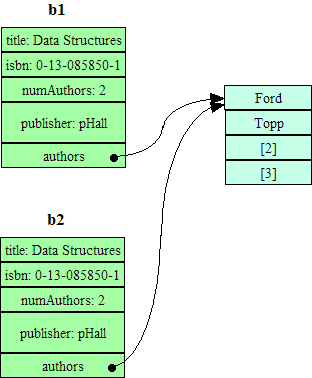 The new result would be something like this.
The new result would be something like this.
-
The authors pointer is copied bit-by-bit
-
two book objects now share the same author array
Co-authors Should Not Share
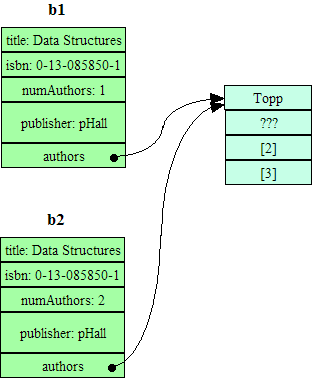 To understand why this is so bad, suppose that we later did
To understand why this is so bad, suppose that we later did
b1.removeAuthor(b1.begin());
to remove the first author from book `b1`.
Unplanned Sharing Leads to Corruption
void Book::addAuthor (Book::AuthorPosition at, const Author& author)
{
if (numAuthors >= MAXAUTHORS)
{
Author* newAuthors = new Author[2*MAXAUTHORS];
for (int i = 0; i < MAXAUTHORS; ++i)
newAuthors[i] = authors[i];
MAXAUTHORS *= 2;
delete [] authors;
authors = newAuthors;
}
int i = numAuthors;
int atk = at - authors;
while (i > atk)
{
authors[i] = authors[i-1];
i--;
}
authors[atk] = author;
++numAuthors;
}
 That’s not even the worst possible scenario. Recall that our code for adding authors works by
That’s not even the worst possible scenario. Recall that our code for adding authors works by
-
Checking to see if there was room in the array.
-
if not,
- allocating a larger array,
- copying the data, and
- deleting the old array:
So if we start from this data state, and then add 3 authors to book 1 (“Doe”, “Smith”, and “Jones”), …
Corrupted Data
 … we would end up with the state shown here.
… we would end up with the state shown here.
-
b1deleted the old array, -
but
b2still has the old array address in its data member.
Sometime it’s Better to Have 2 Copies
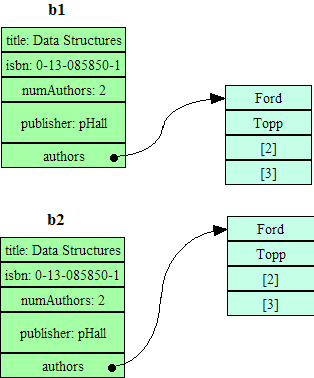 What we really wanted, after the copy:
What we really wanted, after the copy:
Book b2 = b1;
is something more like this:
But to get that, we will not be able to rely on the automatically generated copy constructor for Books.
2.2 Shallow vs Deep Copy
Copy operations are distinguished by how they treat pointers:
-
In a shallow copy, all pointers are copied.
-
Leads to shared data on the heap.
-
In a deep copy, objects pointed to are copied, then the new pointer set to the address of the copied object.
-
Copied objects keep exclusive access to the things they point to.
This was a Shallow Copy

This was a Deep Copy

Book - linked list
#ifndef BOOK_H
#include "author.h"
#include "authoriterator.h"
#include "publisher.h"
class Book {
public:
typedef AuthorIterator AuthorPosition;
Book (Author); // for books with single authors
Book (const Author[], int nAuthors); // for books with multiple authors
std::string getTitle() const { return title; }
void setTitle(std::string theTitle) { title = theTitle; }
int getNumberOfAuthors() const { return numAuthors; }
std::string getISBN() const { return isbn; }
void setISBN(std::string id) { isbn = id; }
Publisher getPublisher() const { return publisher; }
void setPublisher(const Publisher& publ) { publisher = publ; }
AuthorPosition begin() const;
AuthorPosition end() const;
void addAuthor (AuthorPosition at, const Author& author);
void removeAuthor (AuthorPosition at);
private:
std::string title;
int numAuthors;
std::string isbn;
Publisher publisher;
AuthorNode* first;
AuthorNode* last;
friend class AuthorIterator;
};
#endif
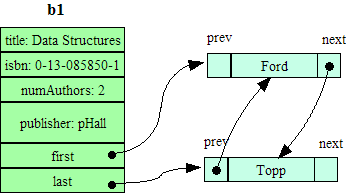 Now let’s consider the problem of copying a book implemented using linked lists.
Now let’s consider the problem of copying a book implemented using linked lists.
If we start with a single book object, b1, as shown here, and then we execute
Book b2 = b1;
because we have provided no copy constructor, the compiler-generated version is used and each data member is copied.
Shallow Copy of Linked List
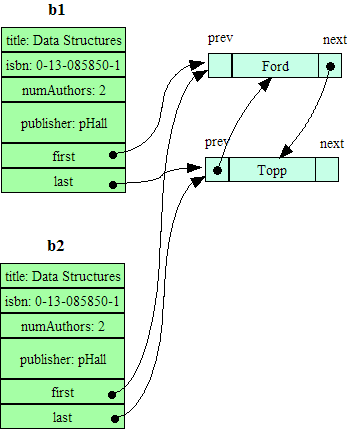 The new result would be something like this.
The new result would be something like this.
-
Again, the pointer data members (
firstandlast) are copied using the default copy procedure for pointers, which is to simply copy the bits of the pointer. -
That has the result of placing the same node addresses in both book objects. In effect, there is one collection of nodes being shared between both books.
-
Once again, that’s a really, really, bad idea!
Corrupted List
For example, suppose that we later did
b1.removeAuthor(b1.begin());
to remove the first author from book `b1`.
 Afterwards, we would have something like this. The change to
Afterwards, we would have something like this. The change to b1 has corrupted b2.
List-Based Copy Constructor
If we want to implement a proper deep copy for our books, we start by adding the constructor declaration:
class Book {
public:
typedef const Author* AuthorPosition;
Book (Author); // for books with single authors
Book (const Author[], int nAuthors); // for books with multiple authors
Book (const Book& b);
std::string getTitle() const { return title; }
void setTitle(std::string theTitle) { title = theTitle; }
⋮
private:
std::string title;
int numAuthors;
std::string isbn;
Publisher publisher;
AuthorNode* first;
AuthorNode* last;
friend class AuthorIterator;
};
Then we supply a function body for this constructor.
Book::Book (const Book& b)
: title(b.title), isbn(b.isbn),
publisher(b.publisher),
numAuthors(0), first(0), last(0)
{
for (AuthorPosition p = b.begin(); p != b.end();
++p)
addAuthor(end(), *p);
}
Linked-List Deep Copy
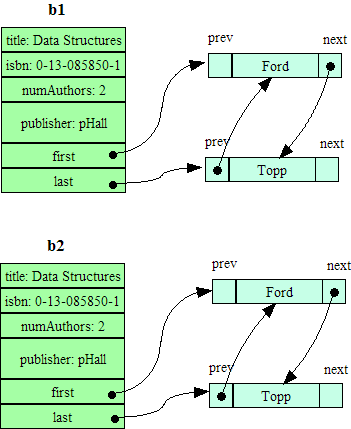 The end result after the copy should be this.
The end result after the copy should be this.
Book - std::list
#ifndef BOOK_H
#include <list>
#include "author.h"
#include "publisher.h"
class Book {
public:
typedef std::list<Author>::iterator AuthorPosition;
typedef std::list<Author>::const_iterator const_AuthorPosition;
Book (Author); // for books with single authors
Book (const Author[], int nAuthors); // for books with multiple authors
std::string getTitle() const { return title; }
void setTitle(std::string theTitle) { title = theTitle; }
int getNumberOfAuthors() const { return numAuthors; }
std::string getISBN() const { return isbn; }
void setISBN(std::string id) { isbn = id; }
Publisher getPublisher() const { return publisher; }
void setPublisher(const Publisher& publ) { publisher = publ; }
const_AuthorPosition begin() const;
const_AuthorPosition end() const;
AuthorPosition begin();
AuthorPosition end();
void addAuthor (AuthorPosition at, const Author& author);
void removeAuthor (AuthorPosition at);
private:
std::string title;
int numAuthors;
std::string isbn;
Publisher publisher;
std::list<Author> authors;
};
#endif
Now let’s consider the problem of copying a book implemented using std::list.
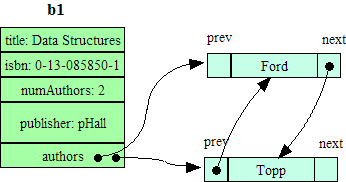 If we start with a single book object,
If we start with a single book object, b1, as shown here, and then we execute
Book b2 = b1;
because we have provided no copy constructor, the compiler-generated version is used and each data member is copied.
Copy of std::list
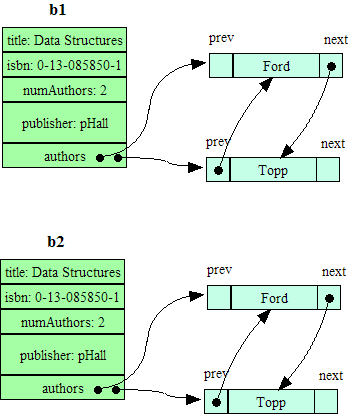 The new result would be something like this. This looks just fine.
The new result would be something like this. This looks just fine.
We don’t need to override the compiler-generated copy constructor in this case.
2.3 Trusting the Compiler-Generated Copy Constructor
By now, you may have perceived a pattern.
Shallow copy is wrong when…
-
Your ADT has pointers among its data members, and
-
You don’t want to share the objects being pointed to.
And it follows that:
Compiler-generated copy constructors are wrong when…
-
Your ADT has pointers among its data members, and
-
You don’t want to share the objects being pointed to.
3 Assignment
When we write book1 = book2, that’s shorthand for book1.operator=(book2).
We tend to do a lot of assignment in typical programming, so, once more, the compiler tries to be helpful:
If you don’t provide your own assignment operator for a class, the compiler generates one automatically.
-
The automatically generated assignment operator works by assigning each data member in turn.
-
If none of the members have programmer-supplied assignment ops, then this is a shallow copy
A Compiler-Generated Assignment Op
class Address {
public:
Address (std::string theStreet, std::string theCity,
std::string theState, std::string theZip);
std::string getStreet() const;
void putStreet (std::string theStreet);
std::string getCity() const;
void putCity (std::string theCity);
std::string getState() const;
void putState (std::string theState);
std::string getZip() const;
void putZip (std::string theZip);
private:
std::string street;
std::string city;
std::string state;
std::string zip;
};
For example, we have not provided an assignment operator for Address class. Therefore the compiler will attempt to generate one, just as if we had written
class Address {
public:
Address (std::string theStreet, std::string theCity,
std::string theState, std::string theZip);
Address& operator= (const Address&);
⋮
A Compiler-Generated Assignment Op (cont.)
The automatically generated body for this assignment operator will be the equivalent of
Address& Address::operator= (const Address& a)
{
street = a.street;
city = a.city;
state = a.state;
zip = a.zip;
return *this;
}
And that automatically generated assignment is just fine for Address.
Return values in Asst Ops
Address& Address::operator= (const Address& a)
{
street = a.street;
city = a.city;
state = a.state;
zip = a.zip;
return *this;
}
The return value returns the value just assigned, allowing programmers to chain assignments together:
addr3 = addr2 = addt1;
This can simplify code where a computed value needs to be tested and then maybe used again if it passes the test, e.g.,
while ((x = foo(y)) > 0) {
do_something_useful_with(x);
}
3.1 Assignment Examples
3.1.1 Book - Simple Arrays
#ifndef BOOK_H
#include "author.h"
#include "publisher.h"
class Book {
public:
typedef const Author* AuthorPosition;
Book (Author); // for books with single authors
Book (const Author[], int nAuthors); // for books with multiple authors
std::string getTitle() const;
void setTitle(std::string theTitle);
int getNumberOfAuthors() const;
std::string getISBN() const;
void setISBN(std::string id);
Publisher getPublisher() const;
void setPublisher(const Publisher& publ);
AuthorPosition begin() const;
AuthorPosition end() const;
void addAuthor (AuthorPosition at, const Author& author);
void removeAuthor (AuthorPosition at);
private:
std::string title;
int numAuthors;
std::string isbn;
Publisher publisher;
static const int MAXAUTHORS = 12;
Author authors[MAXAUTHORS];
};
#endif
Consider the problem of copying a book, and for the moment we will work with our “simple” arrays version.
Book - Simple Arrays (cont.)
 If we start with a single book object,
If we start with a single book object, b1, as shown here, and then we execute
b2 = b1;
because we have provided no assignment operator, the compiler-generated version is used and each data member is copied.
Compiler-Generated Assignment
 The new result would be something like this, which looks just fine.
The new result would be something like this, which looks just fine.
So in this case, we can rely on the compiler-generated assignment operator.
3.1.2 Book - dynamic arrays
Now let’s consider the problem of copying a book implemented using dynamically allocated arrays.
#ifndef BOOK_H
#include "author.h"
#include "publisher.h"
class Book {
public:
typedef const Author* AuthorPosition;
Book (Author); // for books with single authors
Book (const Author[], int nAuthors); // for books with multiple authors
std::string getTitle() const { return title; }
void setTitle(std::string theTitle) { title = theTitle; }
int getNumberOfAuthors() const { return numAuthors; }
std::string getISBN() const { return isbn; }
void setISBN(std::string id) { isbn = id; }
Publisher getPublisher() const { return publisher; }
void setPublisher(const Publisher& publ) { publisher = publ; }
AuthorPosition begin() const;
AuthorPosition end() const;
void addAuthor (AuthorPosition at, const Author& author);
void removeAuthor (AuthorPosition at);
private:
std::string title;
int numAuthors;
std::string isbn;
Publisher publisher;
int MAXAUTHORS;
Author* authors;
};
#endif
Assigning with dynamic arrays
 If we start with a single book object,
If we start with a single book object, b1, as shown here, and then we execute
b2 = b1;
because we have provided no assignment op, the compiler-generated version is used and each data member is copied.
Compiler-Generated Asst
 The new result would be something like this.
The new result would be something like this.
-
The authors pointer is copied bit-by-bit
-
two book objects now share the same author array
This Seems Familiar…
-
We saw earlier that having two books sharing the same array was a bad idea.
-
In this case, we now have the additional disadvantage that we have lost all contact with one of the allocated arrays on the heap,
- a “memory leak” that will never be recovered.
-
The compiler-generated assignment operator implements a shallow copy, and that is not what we want.
Implementing Deep-Copy Assignment
If we want to implement a proper deep copy for our books, we start by adding the operator declaration:
class Book {
public:
typedef const Author* AuthorPosition;
Book (Author); // for books with single authors
Book (const Author[], int nAuthors); // for books with multiple authors
Book (const Book& b);
const Book& operator= (const Book& b);
std::string getTitle() const { return title; }
void setTitle(std::string theTitle) { title = theTitle; }
⋮
private:
std::string title;
int numAuthors;
std::string isbn;
Publisher publisher;
int MAXAUTHORS;
Author* authors;
};
Then we supply a function body for this operator.
const Book& Book::operator= (const Book& b)
{
title = b.title;
isbn = b.isbn;
publisher = b.publisher;
numAuthors = b.numAuthors;
if (b.numAuthors > MAXAUTHORS)
{
MAXAUTHORS = b.MAXAUTHORS;
delete [] authors;
authors = new Author[MAXAUTHORS];
}
for (int i = 0; i < numAuthors; ++i)
authors[i] = b.authors[i];
return *this;
}
3.1.3 Book - linked list
 Now let’s consider the problem of copying a book implemented using linked lists.
Now let’s consider the problem of copying a book implemented using linked lists.
If we start with a single book object, b1, as shown here, and then we execute
b2 = b1;
because we have provided no assignment op, the compiler-generated version is used and each data member is copied.
Shallow Copy of Linked List
 The new result would be something like this.
The new result would be something like this.
-
Again, the pointer data members (
firstandlast) are assigned using the default assignment procedure for pointers, which is to simply copy the bits of the pointer. -
That has the result of placing the same node addresses in both book objects. In effect, there is one collection of nodes being shared between both books.
Shallow Copy of Linked List

-
Once again, that’s a really, really, bad idea!
-
And, once again, the original nodes in
b2are now unreachable memory leaks.
Assignment via Linked Lists
If we want to implement a proper deep copy for our books, we start by adding the operator declaration:
class Book {
public:
typedef const Author* AuthorPosition;
Book (Author); // for books with single authors
Book (const Author[], int nAuthors); // for books with multiple authors
Book (const Book& b);
const Book& operator= (const Book& b);
std::string getTitle() const { return title; }
void setTitle(std::string theTitle) { title = theTitle; }
⋮
private:
std::string title;
int numAuthors;
std::string isbn;
Publisher publisher;
AuthorNode* first;
AuthorNode* last;
friend class AuthorIterator;
};
Then we supply a function body for this operator.
const Book& Book::operator= (const Book& b)
{
title = b.title;
isbn = b.isbn;
publisher = b.publisher;
numAuthors = 0;
for (AuthorPosition p = begin(); p != end();)
{
AuthorPosition nxt = p;
++nxt;
delete p;
p = nxt;
}
first = last = 0;
for (AuthorPosition p = b.begin(); p != b.end(); ++p)
addAuthor(end(), *p);
return *this;
}
Assignment Result
 The end result after the assignment should be this:
The end result after the assignment should be this:
Self-Assignment
If we assign something to itself:
x = x;
we normally expect that nothing really happens.
But when we are writing our own assignment operators, that’s not always the case. Sometimes assignment of an object to itself is a nasty special case that breaks thing badly.
const Book& Book::operator= (const Book& b)
{
title = b.title;
isbn = b.isbn;
publisher = b.publisher;
numAuthors = 0;
for (AuthorPosition p = begin(); p != end();)
{
AuthorPosition nxt = p;
++nxt;
delete p;
p = nxt;
}
first = last = 0;
for (AuthorPosition p = b.begin(); p != b.end(); ++p)
addAuthor(end(), *p);
return *this;
}
What happens if we do b1 = b1;?
Self-Assignment Can Corrupt
-
The first loop removes all nodes from the destination list.
-
The second loop copies all nodes in the source list.
-
But if the source and destination are the same, then by the time we reach the second loop, there won’t be any nodes left to copy.
So, instead of b1 = b1; leaving b1 unchanged, it would actually destroy b1.
Checking for Self-Assignment
const Book& Book::operator= (const Book& b)
{
if (this != &b)
{
title = b.title;
isbn = b.isbn;
publisher = b.publisher;
numAuthors = 0;
for (AuthorPosition p = begin(); p != end();)
{
AuthorPosition nxt = p;
++nxt;
delete p;
p = nxt;
}
first = last = 0;
for (AuthorPosition p = b.begin(); p != b.end(); ++p)
addAuthor(end(), *p);
}
return *this;
}
This is safer.
-
We check to see if the object we are assigning to (
this) is at the same address as the one we are assigning from-
the
&in the expression&bis the C++ address-of operator).
-
-
If the two are the same, we leave them alone.
-
Only if the two addresses are different do we carry on with the assignment.
3.1.4 Book - std::list
#ifndef BOOK_H
#include <list>
#include "author.h"
#include "publisher.h"
class Book {
public:
typedef std::list<Author>::iterator AuthorPosition;
typedef std::list<Author>::const_iterator const_AuthorPosition;
Book (Author); // for books with single authors
Book (const Author[], int nAuthors); // for books with multiple authors
std::string getTitle() const { return title; }
void setTitle(std::string theTitle) { title = theTitle; }
int getNumberOfAuthors() const { return numAuthors; }
std::string getISBN() const { return isbn; }
void setISBN(std::string id) { isbn = id; }
Publisher getPublisher() const { return publisher; }
void setPublisher(const Publisher& publ) { publisher = publ; }
const_AuthorPosition begin() const;
const_AuthorPosition end() const;
AuthorPosition begin();
AuthorPosition end();
void addAuthor (AuthorPosition at, const Author& author);
void removeAuthor (AuthorPosition at);
private:
std::string title;
int numAuthors;
std::string isbn;
Publisher publisher;
std::list<Author> authors;
};
#endif
Now let’s consider the problem of assigning books implemented using std::list.
 If we start with a single book object,
If we start with a single book object, b1, as shown here, and then we execute
b2 = b1;
because we have provided no asst op, the compiler-generated version is used and each data member is copied.
Assigned std::list
 The new result would be something like this. This looks just fine.
The new result would be something like this. This looks just fine.
We don’t need to override the compiler-generated assignment operator in this case.
3.2 Trusting the Compiler-Generated Assignment Operator
By now, you may have perceived a pattern.
Shallow copy is wrong when…
-
Your ADT has pointers among its data members, and
-
You don’t want to share the objects being pointed to.
And it follows that:
Compiler-generated assignment operators are wrong when…
-
Your ADT has pointers among its data members, and
-
You don’t want to share the objects being pointed to.
4 Destructors
Destructors are used to clean up objects that are no longer in use.
If you don’t provide a destructor for a class, the compiler generates one for you automatically.
-
The automatically generated destructor simply invokes the destructors for any data member objects.
-
If none of the members have programmer-supplied destructors, does nothing.
A Compiler-Generated Destructor
class Address {
public:
Address (std::string theStreet, std::string theCity,
std::string theState, std::string theZip);
std::string getStreet() const;
void putStreet (std::string theStreet);
std::string getCity() const;
void putCity (std::string theCity);
std::string getState() const;
void putState (std::string theState);
std::string getZip() const;
void putZip (std::string theZip);
private:
std::string street;
std::string city;
std::string state;
std::string zip;
};
class Author
{
public:
Author (std::string theName, Address theAddress, long id);
std::string getName() const {return name;}
void putName (std::string theName) {name = theName;}
const Address& getAddress() const {return address;}
void putAddress (const Address& addr) {address = addr;}
long getIdentifier() const {return identifier;}
private:
std::string name;
Address address;
const long identifier;
};
We have not declared or implemented a destructor for any of our classes. For Address and Author, that’s OK.
- Note that the strings probably do contain pointers, but we trust the
std::stringto handle its own cleanup.
4.1 Destructor Examples
4.1.1 Book - simple arrays
#ifndef BOOK_H
#include "author.h"
#include "publisher.h"
class Book {
public:
typedef const Author* AuthorPosition;
Book (Author); // for books with single authors
Book (const Author[], int nAuthors); // for books with multiple authors
std::string getTitle() const;
void setTitle(std::string theTitle);
int getNumberOfAuthors() const;
std::string getISBN() const;
void setISBN(std::string id);
Publisher getPublisher() const;
void setPublisher(const Publisher& publ);
AuthorPosition begin() const;
AuthorPosition end() const;
void addAuthor (AuthorPosition at, const Author& author);
void removeAuthor (AuthorPosition at);
private:
std::string title;
int numAuthors;
std::string isbn;
Publisher publisher;
static const int MAXAUTHORS = 12;
Author authors[MAXAUTHORS];
};
#endif
This version of the book has all of its data in a single block of memory. Assuming that each data member knows how to clean up its own internal storage, there’s really nothing we would have to do when this book gets destroyed.
We can rely on the compiler-provided destructor.
4.1.2 Book - dynamic arrays
#ifndef BOOK_H
#include "author.h"
#include "publisher.h"
class Book {
public:
typedef const Author* AuthorPosition;
Book (Author); // for books with single authors
Book (const Author[], int nAuthors); // for books with multiple authors
Book (const Book& b);
~Book();
const Book& operator= (const Book& b);
std::string getTitle() const { return title; }
void setTitle(std::string theTitle) { title = theTitle; }
int getNumberOfAuthors() const { return numAuthors; }
std::string getISBN() const { return isbn; }
void setISBN(std::string id) { isbn = id; }
Publisher getPublisher() const { return publisher; }
void setPublisher(const Publisher& publ) { publisher = publ; }
AuthorPosition begin() const;
AuthorPosition end() const;
void addAuthor (AuthorPosition at, const Author& author);
void removeAuthor (AuthorPosition at);
private:
std::string title;
int numAuthors;
std::string isbn;
Publisher publisher;
int MAXAUTHORS;
Author* authors;
};
#endif
 In this version of the
In this version of the Book class, a portion of the data is kept on the heap, in a number of linked list nodes allocated on the heap.
-
If this object were destroyed, we would need to be sure that the storage allocated for the array is recovered.
-
That won’t happen in the compiler-generated destructor, because the default action on pointers is to do nothing.
Implementing the Dyn. ArrayDestructor
We start by adding the destructor declaration:
class Book {
public:
typedef const Author* AuthorPosition;
Book (Author); // for books with single authors
Book (const Author[], int nAuthors); // for books with multiple authors
Book (const Book& b);
const Book& operator= (const Book& b);
~Book();
std::string getTitle() const { return title; }
void setTitle(std::string theTitle) { title = theTitle; }
⋮
private:
std::string title;
int numAuthors;
std::string isbn;
Publisher publisher;
int MAXAUTHORS;
Author* authors;
};
Then we supply a function body for this destructor.
Book::~Book()
{
delete [] authors;
}
Not much needs to be done - just delete the pointer to the array of authors.
4.1.3 Book - linked list
In this version of the Book class, a portion of the data is kept in an array allocated on the heap.
#ifndef BOOK_H
#include "author.h"
#include "authoriterator.h"
#include "publisher.h"
class Book {
public:
typedef AuthorIterator AuthorPosition;
Book (Author); // for books with single authors
Book (const Author[], int nAuthors); // for books with multiple authors
Book (const Book& b);
~Book();
const Book& operator= (const Book& b);
std::string getTitle() const { return title; }
void setTitle(std::string theTitle) { title = theTitle; }
int getNumberOfAuthors() const { return numAuthors; }
std::string getISBN() const { return isbn; }
void setISBN(std::string id) { isbn = id; }
Publisher getPublisher() const { return publisher; }
void setPublisher(const Publisher& publ) { publisher = publ; }
AuthorPosition begin() const;
AuthorPosition end() const;
void addAuthor (AuthorPosition at, const Author& author);
void removeAuthor (AuthorPosition at);
private:
std::string title;
int numAuthors;
std::string isbn;
Publisher publisher;
AuthorNode* first;
AuthorNode* last;
friend class AuthorIterator;
};
#endif

-
If this object were destroyed, we would need to be sure that the storage allocated for the nodes is recovered.
-
That won’t happen in the compiler-generated destructor, because the default action on pointers is to do nothing.
Implementing a Linked List Destructor
We start by adding the destructor declaration:
class Book {
public:
typedef const Author* AuthorPosition;
Book (Author); // for books with single authors
Book (const Author[], int nAuthors); // for books with multiple authors
Book (const Book& b);
const Book& operator= (const Book& b);
~Book();
std::string getTitle() const { return title; }
void setTitle(std::string theTitle) { title = theTitle; }
⋮
private:
std::string title;
int numAuthors;
std::string isbn;
Publisher publisher;
AuthorNode* first;
AuthorNode* last;
friend class AuthorIterator;
};
Then we supply a function body for this destructor.
Book::~Book()
{
AuthorPosition nxt;
for (AuthorPosition current = begin(); current != end(); current = nxt)
{
nxt = current;
++nxt;
delete current.pos;
}
}
This one is more elaborate. We need to walk the entire list, deleting each node as we come to it.
4.1.4 Book - std::list
- This version of the book has no pointers among its data members.
#ifndef BOOK_H
#include <list>
#include "author.h"
#include "publisher.h"
class Book {
public:
typedef std::list<Author>::iterator AuthorPosition;
typedef std::list<Author>::const_iterator const_AuthorPosition;
Book (Author); // for books with single authors
Book (const Author[], int nAuthors); // for books with multiple authors
std::string getTitle() const { return title; }
void setTitle(std::string theTitle) { title = theTitle; }
int getNumberOfAuthors() const { return numAuthors; }
std::string getISBN() const { return isbn; }
void setISBN(std::string id) { isbn = id; }
Publisher getPublisher() const { return publisher; }
void setPublisher(const Publisher& publ) { publisher = publ; }
const_AuthorPosition begin() const;
const_AuthorPosition end() const;
AuthorPosition begin();
AuthorPosition end();
void addAuthor (AuthorPosition at, const Author& author);
void removeAuthor (AuthorPosition at);
private:
std::string title;
int numAuthors;
std::string isbn;
Publisher publisher;
std::list<Author> authors;
};
#endif
-
It’s entirely likely that the
std::listhas pointers inside it, but we trust its destructor to clean up its own internal data structures. -
With that in mind, there’s really nothing we would have to do when this book gets destroyed.
We can rely on the compiler-provided destructor.
4.2 Trusting the Compiler-Generated Destructor
By now, you may have perceived a pattern.
Compiler-generated destructors are wrong when…
-
Your ADT has pointers among its data members, and
-
You don’t want to share the objects being pointed to.
5 The Rule of the Big 3
The Big 3
The “Big 3” are the
-
copy constructor
-
assignment operator, and
-
destructor
By now, you may have noticed a pattern with these.
The Rule of the Big 3
The rule of the big 3 states that,
if you provide your own version of any one of the big 3, you should provide your own version of all 3.
Why? Because we don’t trust the compiler-generated …
-
copy constructor if our data members include pointers to data we don’t share
-
assignment operator if our data members include pointers to data we don’t share
-
destructor if our data members include pointers to data we don’t share
So if we don’t trust one, we don’t trust any of them.

